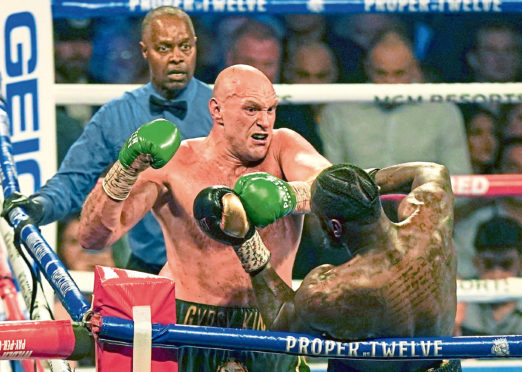Why do boxers have TGIF on their boxing shoes?
Toes Go In First. Just thought I would mention that one because many people have been celebrating boxing over the last few days. Yay. Great fight.
We have a British champion. The Gypsy King has reclaimed his crown. World champion again. Whoop-dee-doo.
Come on, Maciver. Be happy for that at least. That’s something to shout about. Yeah yeah, hurrah.
Boxing was never a sport. It should be labelled for what it is – cruelty and violence for the entertainment of sick people who live empty lives and have lost perspective.
They stump up their hard-earned to get a wee thrill from the sight of blood and injury. Well, they must do. Why else would they bother?
I came to that awful conclusion years ago when I was sent by my newspaper to do a feature on south London boxers.
Croydon lad Duke McKenzie held the WBO bantamweight title. I also interviewed soon-to-be WBC heavyweight title holder Frank Bruno on the day he opened the local water sports centre. The interest in boxing then was massive.
Ugly pugilism has been allowed, even encouraged, by morally-bankrupt legislators for centuries.
Our fathers and grandfathers may have loved the ’Enry Coopers, the Muhammad Alis, the Frank Brunos and the wiry Barry McGuigans served up with comforting, familiar commentary by Harry Carpenter. That didn’t make it right.
We are now in an information age so we can no longer pretend to ignore the facts about what left hooks actually do to the brains and personalities of boxing’s long and desperately sad list of bloody victims.
We can look up for ourselves pictures of deceased boxers’ smashed cerebellums. The Association of Neurological Surgeons found nearly 90% of boxers suffer a debilitating brain injury of some kind during an average career.
Those injuries include damage to the surface of the brain, tearing of the nerve networks, lesions, bleeding and catastrophic large clots inside the brain.
For decades, the trend which became a joke was that retired boxers were a bit prematurely forgetful. They were actually seriously brain-damaged.
Friends put TGIF on their shoes but no one really laughed. Everyone secretly knew the reason was tragic.
Amateur boxers are also at risk. Ex-boxers are at high risk of developing Parkinson’s disease and Alzheimer’s disease.
Yet it’s allowed – a nationhood of Britons like hyenas round a stumbling antelope.
Why do so few British people care? Boxers know the risks and they do it for the money, squeal the apologists for cruelty.
No wonder the British Medical Association, which has stated the facts for years, is tearing its associated hair out.
Money. Not everyone understands boxers and money. I know someone who works in the dispatch department of a well-known online shopping company.
He said: “Professional boxers are among the highest paid people in the world. Apparently, my bosses at Amazon didn’t get that memo.” Errr, right.
Does battering someone for money make it right, then? Would you push your own darling son up into a ring with Deontay Wilder as long as he got a big purse at the end to fund his dementia treatment and his premature burial?
That is too often the reality. Why then is it OK for someone else’s son to be sent to be pulverised just because he knows no other way to earn a living?
Amateur boxers see the sport as a way to develop character.
There are other ways but, more importantly, the entire charade of touting Wildlife On One with human beings instead of antelopes needs to be banned if we are to continue to claim to be a fair and decent country.
This week the overwhelming evidence of damaged skulls and brains caused to youngsters by heading a football forced Scottish politicians to ban headers.
That took too long, too. These same politicians still ignore the vile ritualistic orgy of violence that we are still hoodwinked into referring to as the “sport” of boxing.
The professional boxers I met and wrote about at a dank, soulless gym in south London all those years ago were a mixed-up lot.
Privately, they fretted over their poor financial future unless they reduced their friends to broken, helpless messes – again and again. That was the dastardly reality of their lives – necessary just to earn a living.
A couple of honest ones would whisper – off-the-record, over a pint afterwards – that they hated the alleged sport but they would keep doing it until they no longer could. The wife expected. The kids expected. England expected.
Scotland needs to take the lead, as it has before in other worthwhile campaigns.
Like all of us who have to face horrible, stark reality, there is also dark humour in the most forlorn lives.
When I asked one Croydon ex-champion boxer what his message to readers would be, he insisted the readers would have to wait for a few words on his gravestone.
It would read: “You can stop counting. I’m not getting up.”

